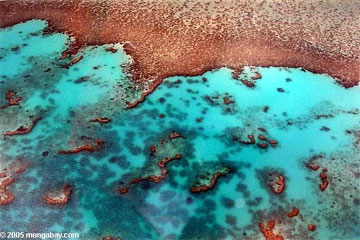Coral reef parks established by locals more effective than government reserves
Coral reef parks established by locals more effective than government reserves
WCS
July 31, 2006
Coral reef marine protected areas established by local people for traditional use can be far more effective at protecting fish and wildlife than reserves set up by governments expressly for conservation purposes, according to a study by the New York-based Wildlife Conservation Society (WCS) and other groups.

World’s coral reefs threatened by lack of effective protection Of the 18.7% of tropical coral reefs that lie within “Marine Protected Areas,” less than 2% are extended protection complete with regulations on extraction, poaching and other major threats, according to an analysis published in Science Magazine on June 23. In Fiji locals grow “live rock” for aquarium trade with university help In a unique project that combines environmental conservation, economic development and drug discovery research, scientists and policy experts led by the Georgia Institute of Technology are collaborating with the villagers of Tagaqe and the University of the South Pacific to explore, protect and generate income for islanders from their shallow fringing coral reef. |
The study, published in the latest issue of the journal Current Biology, found that fish grew larger in small traditionally managed reserves, rather than in larger national parks and most co-managed reserves run by several partner organizations. The authors also found that traditionally managed reserves did not permanently close fishing around reefs, a technique often touted by managers as the best way to safeguard fish stocks. Instead communities occasionally opened their reserves to obtain food for feasts — an important incentive to ensure that temporary closures were enforced.
“This study clearly shows that communities with a direct stake in preserving healthy fisheries around reefs can often serve as the best managers and police to protect these areas from overfishing,” said WCS biologist Dr. Tim McClanahan, the study’s lead author. “Governments wishing to establish marine protected areas can learn a valuable lesson that communities must see some benefit of closures to ensure their participation and adherence to the rules.”
The authors looked at a total of four national parks, four-co-managed reserves and three traditional reserves in Indonesia and Papua New Guinea, finding that traditional reserves were often managed to meet community needs, not strict conservation goals established by outsiders. These reserves also tended to be located in remote areas with small human populations, with limited influence by outsiders and markets. The one co-managed reserve that enjoyed similar results found in traditional reserves was established after careful consultation with the community along with considerable donor support.
On the basis of their findings, the authors propose that while large, permanent marine protected areas may provide the best protection for species that are at particular risk from overfishing, a combination of such large marine protected areas and traditionally managed systems may represent the best overall solution for meeting conservation and community goals and reversing the degradation of reef ecosystems.
Other authors of the study include Michael J. Marnane of the Wildlife Conservation Society; Joshua E. Cinner of the Centre of Excellence for Coral Reef Studies, James Cook University in Townsville, Australia; and William Kiene of Fagatele Bay National Marine Sanctuary in Pago Pago, American Samoa.
This is a modified news release from WCS.